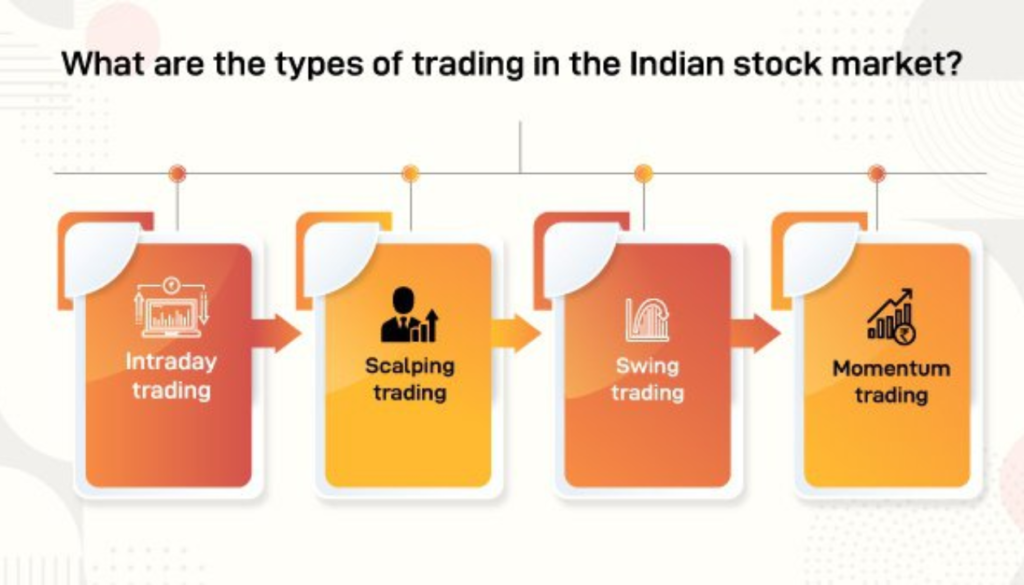The stock market is a crucial component of the financial system, serving as a platform for companies to raise capital and for investors to buy and sell shares. In India, the stock market has seen significant growth and development, attracting millions of investors. Understanding how the Indian stock market works in India is essential for anyone looking to invest and grow their wealth. This guide provides a comprehensive overview of the Indian stock market, its key players, trading process, and benefits.
Table of Contents
1. Overview of the Indian Stock Market
The Indian stock market comprises two major exchanges: the Bombay Stock Exchange (BSE) and the National Stock Exchange (NSE). These exchanges facilitate the buying and selling of stocks, bonds, and other securities. The BSE, established in 1875, is Asia’s oldest stock exchange, while the NSE, established in 1992, is known for its electronic trading system.
2. Key Players in the Indian Stock Market

The stock market involves various participants, including:
A. Investors: Individuals or institutions that buy and sell securities.
B. Brokers: Registered members of stock exchanges who facilitate trading on behalf of investors.
C. Regulators: The Securities and Exchange Board of India (SEBI) regulates the stock market to protect investor interests and ensure fair trading practices.
D. Listed Companies: Companies that issue shares to the public and are listed on the stock exchanges.
3. Trading Process in the Indian Stock Market
The trading process in the Indian stock market involves several steps:
A. Opening a Demat and Trading Account: Investors need to open a Demat (Dematerialized) account to hold their securities in electronic form and a trading account to execute trades.
B. Placing Orders: Investors place buy or sell orders through their brokers, specifying the number of shares and the price at which they want to trade.
C. Matching Orders: The stock exchanges use electronic systems to match buy and sell orders based on price and time priority.
D. Execution and Settlement: Once orders are matched, the trade is executed, and the settlement process involves transferring shares from the seller’s account to the buyer’s account and transferring funds from the buyer’s account to the seller’s account. The settlement cycle in India follows a T+2 system, meaning the trade is settled two business days after the transaction.
4. Types of Markets in India

The Indian stock market operates in two types of markets:
A. Primary Market: Where companies issue new shares to raise capital through Initial Public Offerings (IPOs) or Follow-on Public Offerings (FPO Investing in the stock market offers several benefits ).
B. Secondary Market: Where existing shares are traded among investors. This is the market most people refer to when they talk about the stock market.
5. Stock Market Indices
Stock market indices like the Sensex (BSE) and Nifty 50 (NSE) serve as indicators of market performance. These indices are composed of select stocks representing various sectors, providing a snapshot of the overall market trend
6. Benefits of Investing in the Stock Market

A. Potential for High Returns: Historically, stocks have provided higher returns compared to other investment avenues.
B. Liquidity: Stocks can be easily bought and sold, providing liquidity to investors.
C. Diversification: Investing in a variety of stocks can help diversify risk.
D. Ownership in Companies: Buying shares gives investors ownership in companies, allowing them to benefit from their growth and profitability.
7. Risks Involved in Stock Market Investing
While the stock market offers potential for high returns, it also involves risks such as market volatility, economic factors, and company-specific risks. It is essential to conduct thorough research and adopt risk management strategies.
Read More :- The Importance of Fundamental Analysis in Stock Trading , Technical Analysis Tools for Successful Trading
8. Role of SEBI
The Securities and Exchange Board of India (SEBI) is the regulatory authority overseeing the Indian stock market. SEBI’s role includes protecting investor interests, promoting fair trading practices, and ensuring market transparency.
9. Taxation on Stock Market Investments

In India, capital gains from stock market investments are subject to taxation. Short-term capital gains (holding period less than one year) are taxed at 15%, while long-term capital gains (holding period more than one year) exceeding INR 1 lakh are taxed at 10%.
10. Tips for Beginners
For beginners, investing in the stock market can be daunting. Here are some tips to get started:
A. Educate Yourself: Learn the basics of the stock market and different investment strategies.
B. Start Small: Begin with a small investment and gradually increase as you gain experience.
C. Diversify Your Portfolio: Spread your investments across different sectors to mitigate risk.
D. Stay Informed: Keep up with market news and updates to make informed decisions.
Conclusion
Understanding how the stock market works in India is crucial for anyone looking to invest and grow their wealth. By learning the basics, key players, trading process, and benefits, you can make informed decisions and navigate the market effectively. Whether you’re a beginner or an experienced investor, the Indian stock market offers numerous opportunities for financial growth and success.
Frequently Asked Questions
1. What are the primary and secondary markets?
Ans. The primary market is where companies issue new shares to raise capital, while the secondary market is where existing shares are traded among investors.
2. How do I start investing in the Indian stock market?
Ans. To start investing, you need to open a Demat and trading account, choose a reliable broker, and conduct thorough research before making investment decisions.
3. What is the role of SEBI in the stock market?
Ans. SEBI regulates the Indian stock market, ensuring investor protection, market transparency, and fair trading practices.
4. What are stock market indices?
Ans. Stock market indices, like the Sensex and Nifty 50, are indicators of market performance, representing a selection of stocks from various sectors.
5. What are the benefits of investing in the stock market?
Ans. Investing in the stock market offers potential for high returns, liquidity, diversification, and ownership in companies.
